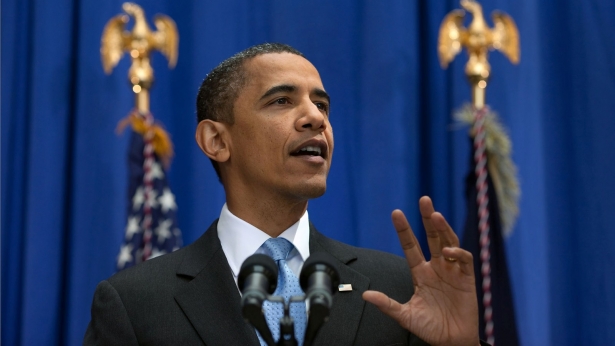
President Obama spoke last week on overhauling U.S. immigration. He went straight to the thorniest issue -- what to do about the millions of unauthorized migrants already here. Obama wants a third path between the extremes of blanket amnesty and mass deportation.
That compromise approach, he goes on to sketch, would be a combination of sending troops to the border, cracking down on employers, and obliging unauthorized immigrants to:
"admit that they broke the law, ... register, pay their taxes, pay a fine, ... learn English [and] get in line and earn their citizenship."
Will this be enough to cause compromise?

President Obama delivering a speech on immigration on July 2/WhiteHouse.gov
Political analyst Jim Kessler has a useful thought exercise: He often asks American audiences if they would accept $1 million in return for giving up their U.S. citizenship. He gets few takers. That is, most Americans consider their citizenship to be an extremely valuable asset. Giving that asset away for free to people who broke laws appears to dilute the value of the asset. Diluting one of people's most valuable assets without consulting them is the kind of thing that will make them upset.
What Obama's compromise ultimately seeks is to allay those fears by making the asset more costly to unauthorized immigrants -- raising its value rather than diluting it. But many things aren't clear: Will opponents of reform be satisfied that the cost of the asset is sufficiently raised by this formula of "register/tax/fine/English/get-in-line" (hey, it rhymes)? And will new enforcement procedures be enough to make all immigrants follow the rules this time?
There are other routes to political compromise, other ways to avoid the perception of diluting the value of citizenship: offer some immigrants something other than citizenship. There is no fundamental reason why the bundle of obligations and privileges we call U.S. citizenship -- jury duty, military service in time of draft, access to federal government services, access to many jobs, and so on -- must always and exclusively be conferred to other people as an unchangeable bundle. Different elements of the bundle can be conferred to different people. Granting some of today's unauthorized immigrants a status that is legal but is not citizenship is another, different way to avoid the perception that amnesty cheapens citizenship.
This is far from radical. It has been the norm in past regularizations of migrants. Amanda Levinson of the Migration Policy Institute lists 24 different regularizations in the U.S. and other countries over the past three decades. These have offered a range of different permits -- that is, a range of different bundles of obligations and privileges. I've seen thoughtful discussions of how citizenship is defined by Alex Aleinikoff, Kerry Howley, and CGD's Lant Pritchett, and there are many others. All of them point out in different ways that there have always been different bundles of obligations and privileges given to people living in the same place, and it is up to societies to choose how many bundles there are, what's in each bundle, and who gets them.
So why is it that in the Obama speech, the only alternative offered to mass deportation or blanket amnesty was that of a universal-but-costly path to full citizenship? Certainly not everyone who wants to come work in the U.S. for a substantial period wants to become a U.S. citizen. And if offering something other than a path to citizenship for some of today's unauthorized immigrants turned out to be the key to achieving compromise -- and moving past the train wreck we have now -- then it would be better than the alternative.
To be specific, suppose that some of today's irregular migrants were offered a temporary visa, for a period of a few years? It would allow them to emerge from the shadows, making it harder for them to bid down wages for all workers by working below minimum wage in secret. Many irregular migrants working here now don't want to stay forever and would gladly take the chance. There would be less perceived dilution of the value of U.S. citizenship, because what's being given to those workers would not be citizenship. In other words, this could be a win-win for some migrants and for many U.S. citizens.
I've heard at least three objections to such a proposal:
- First, it might not be seen to be compatible with American traditions of permanent immigration. But there was actually a large degree of circular migration in U.S. history; notably, roughly 40% of Italians who came in the early 20th century later returned to Italy.